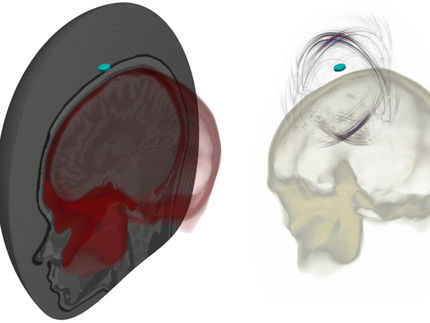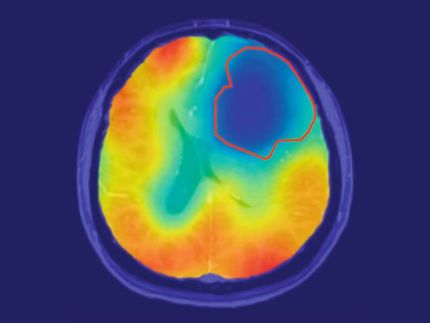New imaging procedures in cancer surgery
Helmholtz High Impact Award for Oliver Bruns and Ellen Sletten
Biochemist Oliver Bruns (NCT/UCC Dresden) and chemist Ellen Sletten (UCLA) have been presented with the Helmholtz High Impact Award 2024 by the Helmholtz Association and the “Stifterverband für die Deutsche Wissenschaft” for their research into an innovative medical imaging technology in the short-wave infrared range. The procedure they have developed has the potential to significantly improve surgical removal of tumors. At the award ceremony in Berlin, the two scientists were presented with the award – endowed with € 50,000 – in recognition of their interdisciplinary research.
In optical imaging in humans, the greatest challenge is to penetrate the tissue. Current imaging techniques in medicine reach their limits in deeper tissue layers. In cancer treatment, for instance, residual tumors or individual cancer cells at the margins of tumors and in lymph nodes cannot yet be detected. Professor Ellen Sletten and Professor Oliver Bruns are now being given the Helmholtz High Impact Award 2024 for their newly developed method of combining short-wave infrared light with special fluorescent dyes and state-of-the-art camera technology to make these hitherto undetectable tumor cells visible.
“By using infrared in imaging, we can determine different tissue types based on their water content,” says Oliver Bruns when explaining the process known as SWIR imaging. In combination with special fluorescent dyes, we can now target certain tissues and structures, such as tumors or blood vessels, and make them visible. This is what the scientists are currently investigating. “The development of new contrast agents allows surgeons to detect tumors more precisely during surgery. Our contrast agents illuminate the edge of the tumor and make it easier to remove only the cancerous tissue while preserving as much healthy tissue as possible,” adds Ellen Sletten.
The intention is to put the technology to use as quickly as possible. The National Center for Tumor Diseases Dresden (NCT/UCC) provides the ideal setting for Ellen Sletten and Oliver Bruns’ research. The joint institution involving the German Cancer Research Center (German abbreviation: DKFZ), the Faculty of Medicine at TU Dresden, the Carl Gustav Carus University Hospital Dresden and the Helmholtz-Zentrum Dresden-Rossendorf (HZDR) has set itself the goal of improving cancer treatment for patients, using the latest technologies. “For the imaging systems, we are currently conducting clinical studies together with physicians in Dresden and Stanford to demonstrate benefits for patients,” says Bruns.
Oliver Bruns has headed the Department of Functional Imaging in Surgical Oncology at NCT/UCC Dresden since 2022. He holds a DKFZ-funded Chair at the Faculty of Medicine of TU Dresden. Previously, he was employed at the Helmholtz Pioneer Campus Munich, where a large part of the research that is now being honored by this award was carried out. Ellen Sletten is a professor at the University of California, Los Angeles (UCLA) and is one of the most renowned chemists at her university. She is particularly well known for her research on short-wave infrared dyes.
Ellen Sletten and Oliver Bruns are delighted to have their years of research recognized: “We have been working together on this project for a decade. It is great to see how much we have already been able to achieve,” says Ellen Sletten.
“The research of Professor Bruns and Professor Sletten will revolutionize imaging in surgery in the coming years,” Esther Troost, Dean of the Faculty of Medicine, firmly believes. “It is fantastic that Professor Bruns and his team, who have been working on this technology for years, will provide major benefits to research and clinical practice,” adds Professor Michael Albrecht, Medical Director at Dresden University Hospital.
Just recently, to further advance this highly innovative technology, Oliver Bruns and Ellen Sletten were awarded a 2.2 million US dollar grant from the Chan Zuckerberg Initiative for their outstanding research at the interface of biology, chemistry, engineering and medicine.
Most read news
Organizations
Other news from the department science

Get the analytics and lab tech industry in your inbox
By submitting this form you agree that LUMITOS AG will send you the newsletter(s) selected above by email. Your data will not be passed on to third parties. Your data will be stored and processed in accordance with our data protection regulations. LUMITOS may contact you by email for the purpose of advertising or market and opinion surveys. You can revoke your consent at any time without giving reasons to LUMITOS AG, Ernst-Augustin-Str. 2, 12489 Berlin, Germany or by e-mail at revoke@lumitos.com with effect for the future. In addition, each email contains a link to unsubscribe from the corresponding newsletter.
























































